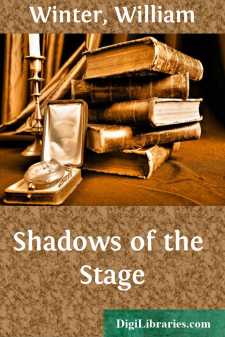Categories
- Antiques & Collectibles 13
- Architecture 36
- Art 48
- Bibles 22
- Biography & Autobiography 813
- Body, Mind & Spirit 142
- Business & Economics 28
- Children's Books 15
- Children's Fiction 12
- Computers 4
- Cooking 94
- Crafts & Hobbies 4
- Drama 346
- Education 46
- Family & Relationships 57
- Fiction 11828
- Games 19
- Gardening 17
- Health & Fitness 34
- History 1377
- House & Home 1
- Humor 147
- Juvenile Fiction 1873
- Juvenile Nonfiction 202
- Language Arts & Disciplines 88
- Law 16
- Literary Collections 686
- Literary Criticism 179
- Mathematics 13
- Medical 41
- Music 40
- Nature 179
- Non-Classifiable 1768
- Performing Arts 7
- Periodicals 1453
- Philosophy 64
- Photography 2
- Poetry 896
- Political Science 203
- Psychology 42
- Reference 154
- Religion 513
- Science 126
- Self-Help 84
- Social Science 81
- Sports & Recreation 34
- Study Aids 3
- Technology & Engineering 59
- Transportation 23
- Travel 463
- True Crime 29
Shadows of the Stage
by: William Winter
Description:
Excerpt
THE GOOD OLD TIMES.
It is recorded of John Lowin, an actor contemporary with Shakespeare and associated with several of Shakespeare's greater characters (his range was so wide, indeed, that it included Falstaff, Henry the Eighth, and Hamlet), that, having survived the halcyon days of "Eliza and our James" and lingered into the drab and russet period of the Puritans, when all the theatres in the British islands were suppressed, he became poor and presently kept a tavern, at Brentford, called The Three Pigeons. Lowin was born in 1576 and he died in 1654—his grave being in London, in the churchyard of St. Martin-in-the-Fields—so that, obviously, he was one of the veterans of the stage. He was in his seventy-eighth year when he passed away—wherefore in his last days he must have been "a mine of memories." He could talk of the stirring times of Leicester, Drake, Essex, and Raleigh. He could remember, as an event of his boyhood, the execution of Queen Mary Stuart, and possibly he could describe, as an eye-witness, the splendid funeral procession of Sir Philip Sidney. He could recall the death of Queen Elizabeth; the advent of Scottish James; the ruffling, brilliant, dissolute, audacious Duke of Buckingham; the impeachment and disgrace of Francis Bacon; the production of the great plays of Shakespeare and Ben Jonson; the meetings of the wits and poets at the Apollo and the Mermaid. He might have personally known Robert Herrick—that loveliest of the wild song-birds of that golden age. He might have been present at the burial of Edmund Spenser, in Westminster Abbey—when the poet brothers of the author of The Faerie Queene cast into his grave their manuscript elegies and the pens with which those laments had been written. He had acted Hamlet,—perhaps in the author's presence. He had seen the burning of the old Globe Theatre. He had been, in the early days of Charles the First, the chief and distinguished Falstaff of the time. He had lived under the rule of three successive princes; had deplored the sanguinary fate of the martyr-king (for the actors were almost always royalists); had seen the rise of the Parliament and the downfall of the theatre; and now, under the Protectorate of Oliver Cromwell, he had become the keeper of an humble wayside inn. It is easy to fancy the old actor sitting in his chair of state, the monarch of his tap-room, with a flagon of beer, and a church-warden pipe of tobacco, and holding forth, to a select circle of cronies, upon the vanished glories of the Elizabethan stage—upon the days when there were persons in existence really worthy to be called actors. He could talk of Richard Burbage, the first Romeo; of Armin, famous in Shakespeare's clowns and fools; of Heminge and Condell, who edited the First Folio of Shakespeare, which possibly he himself purchased, fresh from the press; of Joseph Taylor, whom it is said Shakespeare personally instructed how to play Hamlet, and the recollection of whose performance enabled Sir William Davenant to impart to Betterton the example and tradition established by the author—a model that has lasted to the present day; of Kempe, the original Dogberry, and of the exuberant, merry Richard Tarleton, after whom that comic genius had fashioned his artistic method; of Alleyne, who kept the bear-garden, and who founded the College and Home at Dulwich—where they still flourish; of Gabriel Spencer, and his duel with Ben Jonson, wherein he lost his life at the hands of that burly antagonist; of Marlowe "of the mighty line," and his awful and lamentable death—stabbed at Deptford by a drunken drawer in a tavern brawl....


